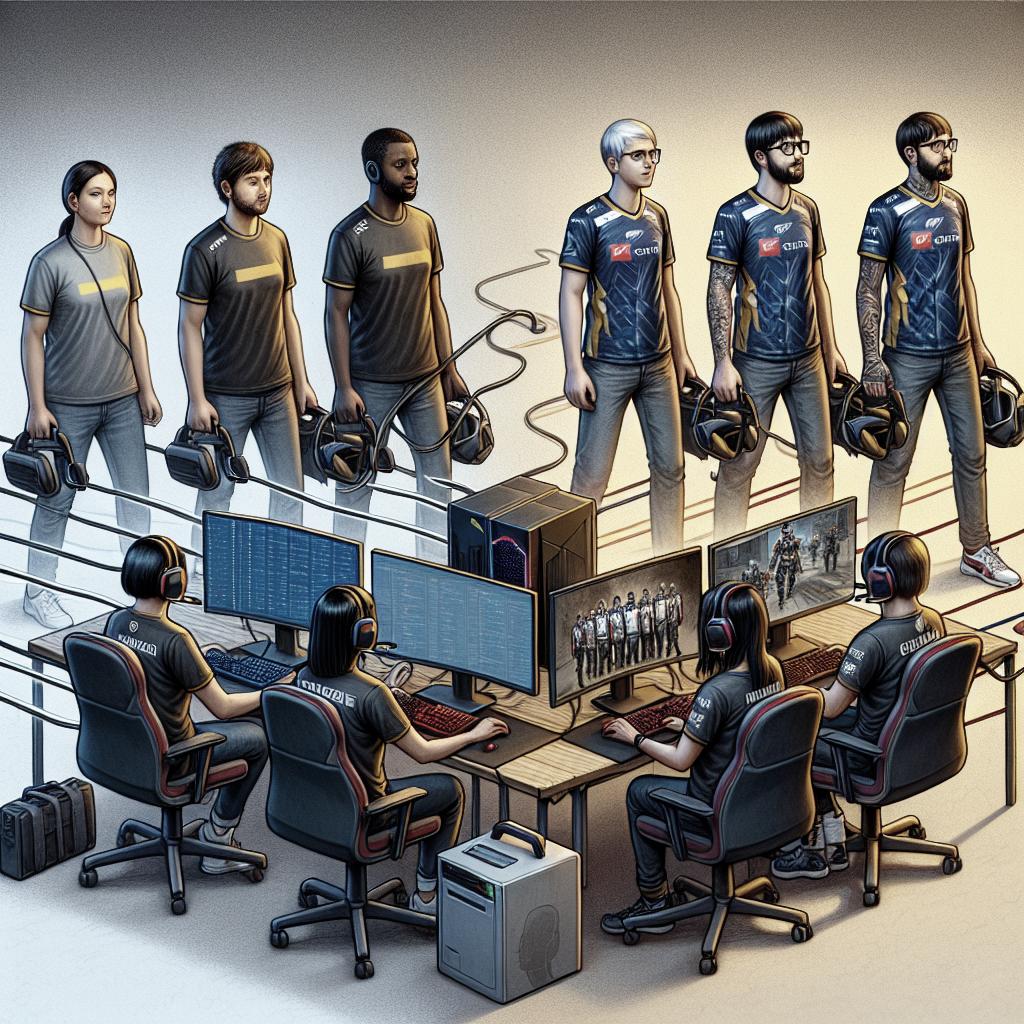The Rise of Esports In just a few short years, the esports industry has witnessed massive growth and evolution, capturing the attention of audiences worldwide. From humble beginnings with informal gatherings and small-scale tournaments, esports has now transitioned into a multi-billion dollar industry with professional leagues, extensive sponsorship deals, and international events that rival traditional sports spectacles. The rise of esports is not only a testament to the growing interest in competitive gaming but also an indication of the industry’s potential for long-term sustainability and success. The expansion of esports leagues is a central aspect of this growth, where game developers and organizers are actively investing in establishing structured, professional environments for players and teams. This expansion signals a shift towards legitimizing esports as a professional pursuit and promises further opportunities for fans, players, and stakeholders. The unprecedented surge in viewership and participation indicates that esports is here to stay, set to redefine entertainment and competition for future generations. Market Growth and Revenue The rapid expansion of esports leagues is mirrored by the impressive growth in market size and revenue within the industry. Globally, esports revenues are projected to reach new heights, driven by diverse revenue streams that include media rights, merchandise, ticket sales, sponsorships, and advertising. This boom is fueled by the gaming industry’s ability to engage younger, digital-savvy audiences who favor on-demand content consumption and interactive experiences over traditional entertainment forms. Key players in the market are capitalizing on the expanding leagues by creating more opportunities for investment and partnerships. Companies are investing in state-of-the-art esports arenas, broadcasting solutions, and technology-enhanced gaming experiences, all contributing to revenue expansion opportunities. The market’s evolution is evidence that esports has transcended from a niche interest to a significant force within the broader entertainment ecosystem. Viewership and Audience The esports audience is expanding rapidly, with millions of enthusiastic viewers tuning in to watch their favorite teams and players compete across various platforms. The widespread appeal of esports is due in part to the global reach of live streaming platforms like Twitch, YouTube Gaming, and Facebook Gaming, which enable real-time engagement and interaction. These platforms provide a space where communities of fans can congregate, share strategies, and celebrate victories, fostering a sense of belonging among enthusiasts. With the advent of esports leagues, the audience’s demographic has diversified. Esports events now pull in international attention, with audiences spanning different cultures and socioeconomic backgrounds. This growth is particularly prominent among millennials and Generation Z, who are drawn to the accessibility and relatability of esports personalities. As the audience grows, so does the potential for the industry to convert viewership into financial support, whether through sponsorships or direct-to-consumer models like pay-per-view. Technological Advancements The expansion of esports leagues coincides with significant technological advancements that are reshaping the landscape of competitive gaming. Virtual Reality (VR) and Augmented Reality (AR) VR and AR are at the forefront of redefining the esports experience. As these technologies evolve, they offer immersive environments that enhance viewer engagement and player interaction, providing more realistic simulation and a new dimension of gameplay. With applications extending to both training and live spectator experiences, the incorporation of AR and VR signifies a shift towards a more integrated and interactive form of esports. Cloud Gaming Cloud gaming is transforming how games are accessed and played, removing the need for high-end hardware and enabling instant access to titles from virtually any device with an internet connection. This technological innovation is particularly beneficial for expanding esports leagues as it allows broader participation from a diverse array of players who may not otherwise have access to gaming consoles or powerful PCs, ultimately fostering inclusivity. Social and Cultural Impact Esports leagues have a profound social and cultural impact, influencing how communities interact and perceive gaming. Community Building Esports acts as a unifying platform allowing individuals from diverse backgrounds to connect over shared passions. As leagues grow, they foster vibrant communities centered around fandoms, creating an environment for friends and strangers alike to share in mutual support and camaraderie. This deep sense of community contributes to the cultural legitimacy of esports as an integral part of contemporary social life. Education and Career Opportunities Esports is also creating novel educational and career opportunities. Many educational institutions are introducing esports programs, offering scholarships, and building facilities dedicated to the development of gaming as both a sport and a discipline. This paradigm shift is encouraging students to explore new career paths within the gaming industry, from professional gameplay to roles in management, marketing, and game development. Economic Impact The economic implications of expanding esports leagues are noteworthy, driving innovation and creating new business opportunities. Job Creation The growth of esports leagues stimulates job creation across multiple sectors, including event management, marketing, broadcasting, content creation, and technology development. As more organizations invest in esports, the demand for skilled professionals continues to rise, supporting local economies and contributing to job diversity in regions embracing esports development. Technological Innovation Esports is a key driver of technological innovation, continually pushing the boundaries of what is possible in gaming and entertainment. Investment in technology and development is vital to sustaining the competitive edge of esports leagues, inspiring companies to partner and invest in new technologies that enhance gaming experiences. Challenges and Opportunities With expansion come inevitable challenges, yet the opportunities for growth within esports are abundant. Mental Health and Well-being The intense dedication required in esports has brought mental health and well-being to the forefront. As leagues expand, it is crucial to address the physical and psychological strains players may face by implementing support structures and promoting balance within the industry. Regulation and Governance As esports professionalism increases, so does the necessity for regulation and governance. Establishing standards and fair play protocols will sustain the integrity of leagues, protect participants, and maintain the industry’s overall credibility in this rapidly expanding sector. Inclusivity and Diversity Inclusivity and diversity are emerging priorities within esports, striving for equal representation in an industry that celebrates differences. Efforts to address disparities in gender, culture, and background will contribute positively to the global growth and acceptance of esports. The Future of Esports and Gaming The horizon for esports is promising, with significant opportunities for expansion and innovation. Expansion into New Markets Esports is venturing into untapped markets, particularly in regions like Southeast Asia, South America, and Africa. These areas present fertile ground for growth as increasing internet penetration and mobile device accessibility attract new players and viewership, broadening the global reach of esports leagues. Integration with Traditional Sports The synergy between traditional and digital sports presents intriguing prospects for the future of esports, combining the best of both worlds. Technological Advancements Traditional sports organizations increasingly see the value in collaborating with esports, investing in teams, and creating crossover events that blend physical and digital realms. This union imposes new technological demands, pushing the boundaries of broadcast innovation, analytic tools, and fan engagement platforms. Social and Educational Impact Esports is creating pathways for educational growth and community enrichment, illustrating its potential beyond mere entertainment. Role of the Global Esports and Gaming Alliance (GEMA) Organizations like GEMA are pivotal in shaping the educational impact of esports by creating frameworks that integrate gaming into educational curricula and community activities. GEMA’s efforts to establish standards and foster international collaboration help build strong foundations for continued growth and innovation in the realm of esports. — Future Prospects
| Aspect | Summary |
|---|---|
| The Rise of Esports | Esports has transitioned from small tournaments to a multi-billion-dollar industry with professional leagues. |
| Market Growth and Revenue | Market is rapidly growing with diverse revenue streams like media rights, merchandise, and sponsorships. |
| Viewership and Audience | Audience is expanding, with live streaming platforms fostering real-time engagement and interaction. |
| Technological Advancements | Technologies like VR, AR, and cloud gaming are reshaping the esports landscape. |
| Social and Cultural Impact | Esports fosters community building and offers new educational and career paths. |
| Economic Impact | Growth in leagues leads to job creation and inspires technological advancement. |
| Challenges and Opportunities | Mental health, regulation, and inclusivity are both challenges and opportunities for growth. |
| The Future of Esports and Gaming | Expansion into new markets is promising for the industry’s sustained growth. |
| Integration with Traditional Sports | Combining traditional and digital sports creates opportunities for innovation. |
| Social and Educational Impact | Organizations like GEMA play a pivotal role in educational integration and international collaboration. |


